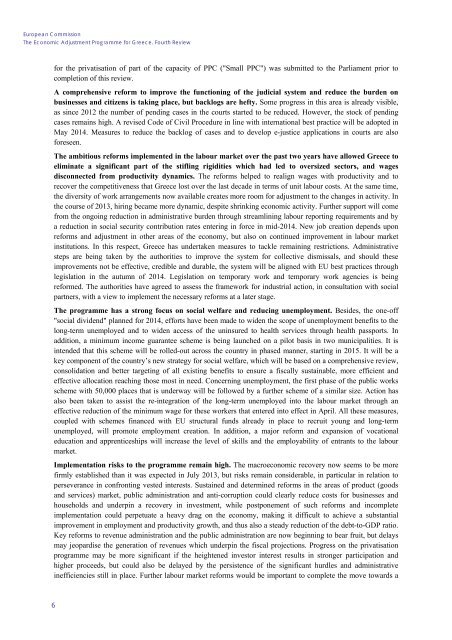ocp192_en
ocp192_en
ocp192_en
You also want an ePaper? Increase the reach of your titles
YUMPU automatically turns print PDFs into web optimized ePapers that Google loves.
European CommissionThe Economic Adjustm<strong>en</strong>t Programme for Greece. Fourth Reviewfor the privatisation of part of the capacity of PPC ("Small PPC") was submitted to the Parliam<strong>en</strong>t prior tocompletion of this review.A compreh<strong>en</strong>sive reform to improve the functioning of the judicial system and reduce the burd<strong>en</strong> onbusinesses and citiz<strong>en</strong>s is taking place, but backlogs are hefty. Some progress in this area is already visible,as since 2012 the number of p<strong>en</strong>ding cases in the courts started to be reduced. However, the stock of p<strong>en</strong>dingcases remains high. A revised Code of Civil Procedure in line with international best practice will be adopted inMay 2014. Measures to reduce the backlog of cases and to develop e-justice applications in courts are alsoforese<strong>en</strong>.The ambitious reforms implem<strong>en</strong>ted in the labour market over the past two years have allowed Greece toeliminate a significant part of the stifling rigidities which had led to oversized sectors, and wagesdisconnected from productivity dynamics. The reforms helped to realign wages with productivity and torecover the competitiv<strong>en</strong>ess that Greece lost over the last decade in terms of unit labour costs. At the same time,the diversity of work arrangem<strong>en</strong>ts now available creates more room for adjustm<strong>en</strong>t to the changes in activity. Inthe course of 2013, hiring became more dynamic, despite shrinking economic activity. Further support will comefrom the ongoing reduction in administrative burd<strong>en</strong> through streamlining labour reporting requirem<strong>en</strong>ts and bya reduction in social security contribution rates <strong>en</strong>tering in force in mid-2014. New job creation dep<strong>en</strong>ds uponreforms and adjustm<strong>en</strong>t in other areas of the economy, but also on continued improvem<strong>en</strong>t in labour marketinstitutions. In this respect, Greece has undertak<strong>en</strong> measures to tackle remaining restrictions. Administrativesteps are being tak<strong>en</strong> by the authorities to improve the system for collective dismissals, and should theseimprovem<strong>en</strong>ts not be effective, credible and durable, the system will be aligned with EU best practices throughlegislation in the autumn of 2014. Legislation on temporary work and temporary work ag<strong>en</strong>cies is beingreformed. The authorities have agreed to assess the framework for industrial action, in consultation with socialpartners, with a view to implem<strong>en</strong>t the necessary reforms at a later stage.The programme has a strong focus on social welfare and reducing unemploym<strong>en</strong>t. Besides, the one-off"social divid<strong>en</strong>d" planned for 2014, efforts have be<strong>en</strong> made to wid<strong>en</strong> the scope of unemploym<strong>en</strong>t b<strong>en</strong>efits to thelong-term unemployed and to wid<strong>en</strong> access of the uninsured to health services through health passports. Inaddition, a minimum income guarantee scheme is being launched on a pilot basis in two municipalities. It isint<strong>en</strong>ded that this scheme will be rolled-out across the country in phased manner, starting in 2015. It will be akey compon<strong>en</strong>t of the country’s new strategy for social welfare, which will be based on a compreh<strong>en</strong>sive review,consolidation and better targeting of all existing b<strong>en</strong>efits to <strong>en</strong>sure a fiscally sustainable, more effici<strong>en</strong>t andeffective allocation reaching those most in need. Concerning unemploym<strong>en</strong>t, the first phase of the public worksscheme with 50,000 places that is underway will be followed by a further scheme of a similar size. Action hasalso be<strong>en</strong> tak<strong>en</strong> to assist the re-integration of the long-term unemployed into the labour market through aneffective reduction of the minimum wage for these workers that <strong>en</strong>tered into effect in April. All these measures,coupled with schemes financed with EU structural funds already in place to recruit young and long-termunemployed, will promote employm<strong>en</strong>t creation. In addition, a major reform and expansion of vocationaleducation and appr<strong>en</strong>ticeships will increase the level of skills and the employability of <strong>en</strong>trants to the labourmarket.Implem<strong>en</strong>tation risks to the programme remain high. The macroeconomic recovery now seems to be morefirmly established than it was expected in July 2013, but risks remain considerable, in particular in relation toperseverance in confronting vested interests. Sustained and determined reforms in the areas of product (goodsand services) market, public administration and anti-corruption could clearly reduce costs for businesses andhouseholds and underpin a recovery in investm<strong>en</strong>t, while postponem<strong>en</strong>t of such reforms and incompleteimplem<strong>en</strong>tation could perpetuate a heavy drag on the economy, making it difficult to achieve a substantialimprovem<strong>en</strong>t in employm<strong>en</strong>t and productivity growth, and thus also a steady reduction of the debt-to-GDP ratio.Key reforms to rev<strong>en</strong>ue administration and the public administration are now beginning to bear fruit, but delaysmay jeopardise the g<strong>en</strong>eration of rev<strong>en</strong>ues which underpin the fiscal projections. Progress on the privatisationprogramme may be more significant if the height<strong>en</strong>ed investor interest results in stronger participation andhigher proceeds, but could also be delayed by the persist<strong>en</strong>ce of the significant hurdles and administrativeineffici<strong>en</strong>cies still in place. Further labour market reforms would be important to complete the move towards a6


